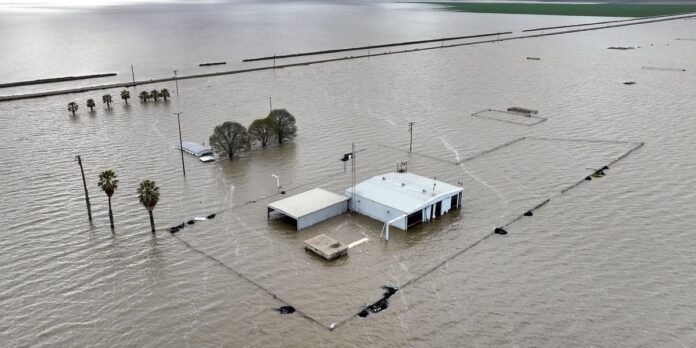A Record 15 Billion-Dollar Disasters Have Hit US So Far This Year: NOAA
The tally could rise with the Atlantic hurricane season set to pick up.
The record pace of pricey extreme weather was announced Tuesday as part of the findings in the latest monthly U.S. climate report from the National Oceanic and Atmospheric Administration (NOAA).
Since record-keeping began in 1980, the U.S. has experienced 363 weather and climate disasters with damages hitting $1 billion, with a consumer price index (CPI) adjustment to 2023, according to NOAA’s National Centers for Environmental Information (NCEI). The total cost of those events topped $2.59 trillion.
As of Tuesday, there have been 15 confirmed events with losses exceeding $1 billion including “one flooding event, 13 severe storm events, and one winter storm event,” NCEI’s related webpage explains. “Overall, these events resulted in the deaths of 113 people and had significant economic effects on the areas impacted. The 1980-2022 annual average is 8.1 events (CPI-adjusted); the annual average for the most recent five years (2018-2022) is 18 events (CPI-adjusted).”

While the total damage for the 15 events neared $40 billion, the costliest disasters were early March storms in the South and East ($6.1 billion), a tornado outbreak March 31-April 1 ($5.4 billion), and California flooding ($4.6 billion).
Jonathan Erdman, a senior meteorologist with The Weather Channel, noted Tuesday that “2017 is the full-year record. There were 22 billion-dollar disasters in 2017, responsible for an estimated $383.7 billion in damage, both the most of any year since 1980. Hurricanes Harvey, Irma, and Maria were responsible for 86% of that damage tally in 2017.”
While the Atlantic hurricane season officially begins in June, it tends to pick up in August—meaning this month could increase the billion-dollar disaster tally and put 2023 on track to break the 2017 record.
Florida Todayreported Monday that “there are now five tropical waves out there in the Atlantic the National Hurricane Center is keeping an eye on that are expected to bring some thunderstorms to the Lesser Antilles and the Caribbean this week, but no major tropical activity is expected over the next few days.”
AccuWeather meteorologists in March forecast 11-15 named storms this season but last week updated that estimate to 13-17.
Erdman pointed out that “since 1980, America’s costliest weather disasters have almost exclusively been hurricanes. For example, 2005’s Hurricane Katrina’s damage—adjusted for inflation to 2023—was $193.8 billion, almost five times the total of all 15 of 2023’s disasters so far. Last year, Hurricane Ian inflicted an estimated $115.2 billion in damage.”
In addition to the billion-dollar disasters, other key findings from NOAA’s new report include that the year-to-date temperature for the contiguous U.S. was 53°F, or 1.7°F above average, with Florida seeing its warmest January-July period yet while Connecticut, Delaware, Louisiana, Maryland, Massachusetts, Mississippi, and New Jersey saw their second-warmest periods.
For just last month, the average temperature across the contiguous U.S. was 75.7°F, or 2.1°F above average, making it the 11th-hottest July in the 129 years recorded. Four states—Arizona, Florida, Maine, and New Mexico—saw their hottest Julys on record.
The recent extreme heat has fueled fresh demands for action from Congress and the White House, with campaigners and even some policymakers pressuring President Joe Biden to stop approving fossil fuel projects and declare a climate emergency.
“We are experiencing extreme weather events across the globe. Heatwaves. Wildfires. Drought. Flooding,” Sen. Jeff Merkley (D-Ore.) said on social media Saturday. “President Biden must declare a climate emergency now!”



